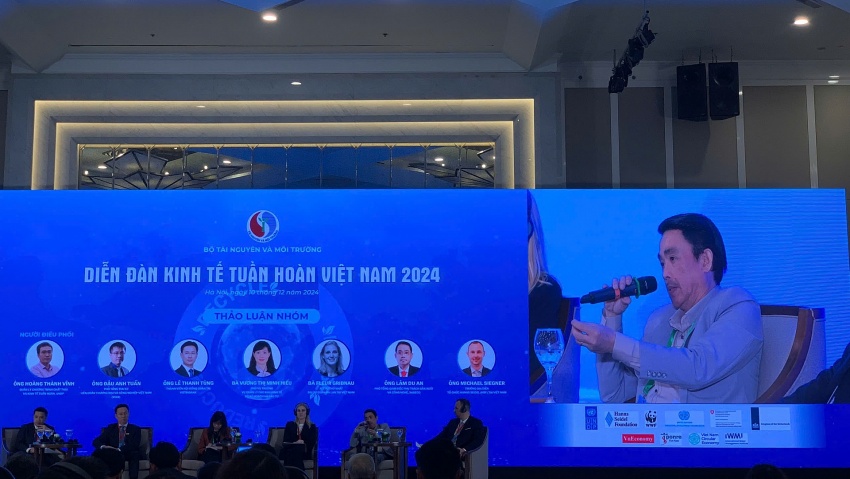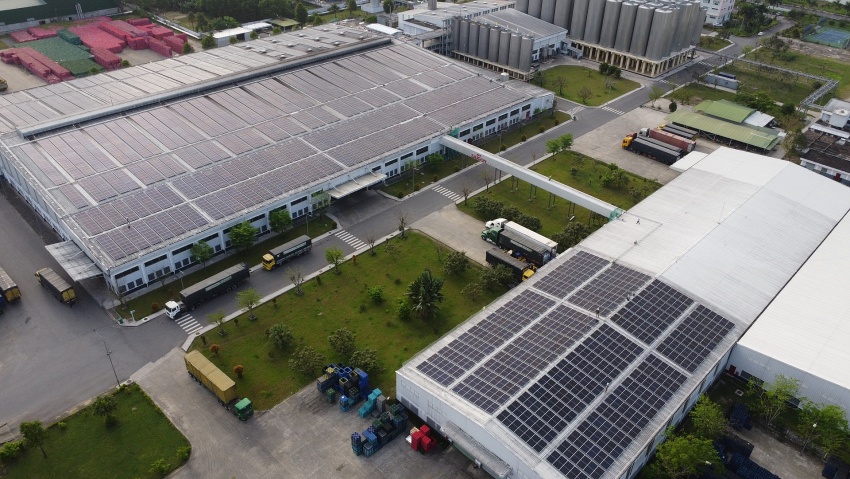SABECO shares its experience at Vietnam Circular Economy Forum 2024
 |
| Lam Du An, deputy general director of SABECO discussed at the third Vietnam Circular Economy Forum |
At the third Vietnam Circular Economy Forum, hosted by the Ministry of Natural Resources and Environment on December 10 in Hanoi, Lam Du An, deputy general director responsible for SABECO's production, stated that the company continuously innovates, strengthens collaboration with partners and local communities, and invests in sustainable technologies.
“Together, we can build a circular economy where waste is minimized, resources are conserved, and environmental impacts are reduced, ensuring a brighter future for Vietnam,” he stated.
SABECO and its subsidiaries are committed to producing high-quality beverages, steadfastly pursuing its sustainable development strategy, with the circular economy being a key pillar in its sustainability journey.
“When we discuss the role of the circular economy in the brewing industry, the critical areas where our company is making an impact include sustainable packaging, water management, energy efficiency, and waste reduction,” Du An added.
“By applying the principles of the circular economy, we offer promised solutions to minimize waste, optimize resources, and reduce environmental impact. This approach enables us to promote sustainability not only within the brewing industry but also in the wider community.”
Applying circular economy
 |
Many SABECO breweries are installed with rooftop solar power systems to help save electricity and reduce CO2 emissions. Photo: SABECO |
SABECO operates a model in which all of its packaging is reusable and recyclable, while also aiming for 100 per cent biodegradable packaging by 2040.
Since 2019, the company has enhanced product packaging designs, reducing packaging weight to significantly cut costs and raw material usage, in compliance with the Environmental Protection Law and the Extended Producer Responsibility framework.
It has also implemented numerous solutions to optimize water usage, introducing over 50 water and energy initiatives in the past five years, achieving a 65 per cent reduction in water consumption during production
By 2026, SABECO aims to cut water usage by 75 per cent and ensure all wastewater is treated and returned to natural ecosystems.
In 2024, the company successfully reduced water usage to 2.86 liters per liter of beer, down from three liters in 2022 and seven liters in 2019. The company remains committed to continuous improvement, targeting a further reduction to 1.5 liters per liter of beer within the next two years.
SABECO has also launched numerous energy management initiatives, targeting to reduce electricity consumption by 43 per cent, equivalent to cutting 65,000 tonnes of CO2 emissions. By 2026, the company targets a 50–60 per cent reduction, corresponding to approximately 75,000 tonnes of emissions.
Additionally, SABECO is utilising renewable energy sources, such as solar power, with a plan to use 50 per cent renewable energy by 2026.
Currently, 12 out of 26 factories are equipped with solar power systems, supplying around one-quarter of the total electricity demand. The company plans to expand installations across all available roof space, potentially covering 37 per cent of its energy requirements.
A trend that cannot be reversed
The transition towards a green and circular economy has emerged as an inevitable, objective, and irreversible trend, serving as a key aspiration for many nations worldwide. This approach seeks to foster economic prosperity, ensure environmental sustainability, and maintain social equity.
According to Du An, the circular economy is gaining global traction, with countries in Asia such as China, Japan, and Singapore achieving notable success. This presents SABECO with an opportunity to study and implement circular economy strategies within the company.
“SABECO can leverage scientific advancements in its circular economy strategy,” Du An said. “The adoption of a circular economy ensures that the country's resources are preserved for future generations while creating a cleaner environment. This approach is likely to gain societal support, providing a favorable foundation for us as we implement our circular economy strategy.”
What the stars mean:
★ Poor ★ ★ Promising ★★★ Good ★★★★ Very good ★★★★★ Exceptional
 Tag:
Tag:
Related Contents
Latest News
More News
- Heavy industries set for pilot greenhouse gas quotas (December 25, 2025 | 10:00)
- Swedfund invests in MSME growth and climate action in Vietnam (December 19, 2025 | 11:42)
- GreenYellow brings solar energy to light up remote schools in Tuyen Quang province (December 19, 2025 | 08:00)
- Charge+, Grab partner to develop EV charging network in Vietnam (December 18, 2025 | 17:11)
- Linking sci-tech and innovation to Vietnam’s net-zero future (December 18, 2025 | 14:31)
- Driving double-digit growth through green and circular transformation in Vietnam (December 17, 2025 | 09:00)
- Standard Chartered and ACCA deepen collaboration to develop Vietnam’s talent for a sustainable future (December 15, 2025 | 18:18)
- Schaeffler reports strong early output from Dong Nai solar project (December 12, 2025 | 15:16)
- Forestry conference highlights biodiversity and sustainability goals (December 09, 2025 | 13:35)
- Home Credit honoured among top 10 sustainable companies in trade and services (December 09, 2025 | 12:18)























 Mobile Version
Mobile Version